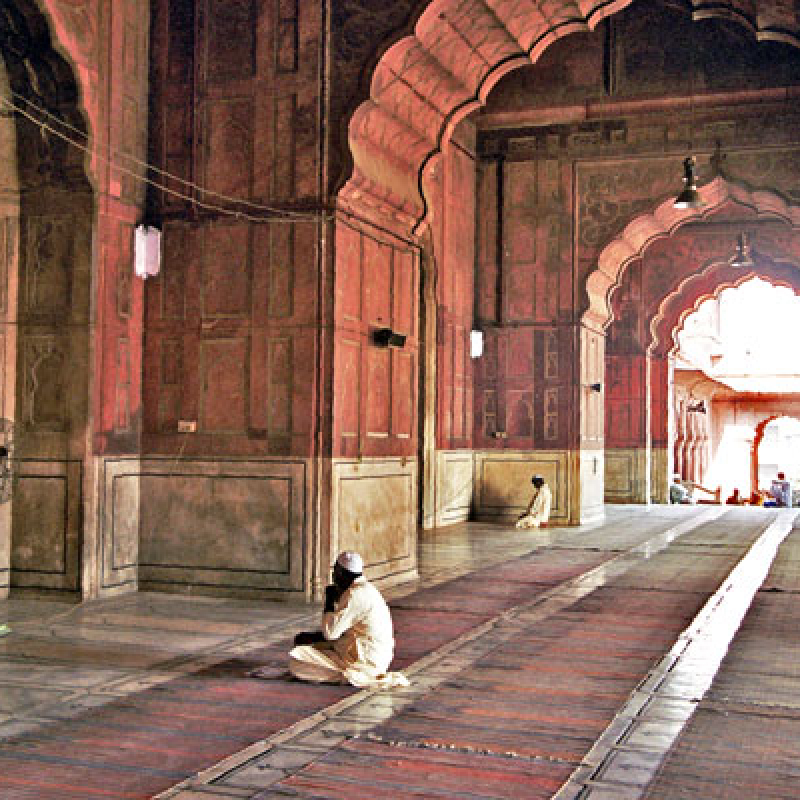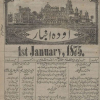The observance of the holy month of Ramzan is an important element of Islamic religious practice. However, not many know that the concept of fasting and Ramzan/Ramadan as ‘month of abstinence’ is actually pre-Islamic. Sahapedia traces the history and development of Ramzan as a religious practice. (In pic: Ramzan prayers at Jama Masjid, Delhi; Photo courtesy: Baldiri/CC BY-SA)
The holy month of Ramzan is one of the most important observances by the followers of Islam, across the world. The ninth month of the Islamic calendar is characterised by fasting, praying and giving zakat, however, the observance of a month of fasting and abstinence is actually a pre-Islamic practice in Arabia that was adopted, continued and tweaked from 622 AD onwards. That is, when Prophet Muhammad institutionalised this fast through a passage in the Quran. In fact, the mention of fasting in the Quran refers to it as a pre-existing practice.
This would also indicate why there is a constant debate regarding the spelling of Ramzan with a ‘z’, as it is known in India, versus the Arabic Ramadan, with a ‘d / dh’, which has been gaining worldwide prominence in the twenty-first century. ‘People have suddenly begun to call it ‘Ramadan’, since that is the pronunciation of the word in the Quran,’ Delhi-based writer Rana Safvi said in 2015. ‘But as a child, growing up in Lucknow, it was always called ‘Ramzan’. This is a completely new thing.’[1]
Also see | Ramzan and Eid ul Fitr
Ramadan literally means ‘intense heat’,[2] indicative of the summer month to which it was originally ascribed. But with the adoption of the lunar Islamic calendar in the seventh century, the month keeps shifting all through the year.
Ramadan in pre-Islamic Arabia
In Studies in Islamic History and Institutions, while tracing the history and development of Ramzan, S.D. Goitein writes about how ‘pre-Islamic Arabs were familiar with the idea of holy months as well as with fasting. Certain passages in the Koran and some Muslim oral traditions make it likely that even the practice of fasting during a whole month was known to the ancient Arabs.’[3] Such oral traditions mention a month of peace and truce between warring tribes in the Arab region, as indicated by historians such as Farzana Moon in No Islam but Islam.[4]
According to Goitein, holy months are attested to in the Quran, which takes for granted that the prohibition of fighting for the time of their duration was as valid in Islam as it was in paganism. Many trustworthy references to them are found in pre-Islamic poetry and in the ancient traditions. This institution, however, later became obsolete in Islam, since war between Muslims was—and continues to be—theoretically prohibited altogether.
Related | Ramzan: Some lesser known practices and rituals
The month of Ramzan gains specific prominence since Muhammad recorded that he started receiving the revelations of Quran during this month (August 610 AD of the Gregorian calendar). While the month is clearly mentioned, the actual date is unclear.
The timing of this initial revelation is given special significance as the ‘night of power’—'We have revealed it (Quran) in the night of power. And what will explain to you what the night of power is? The night of power is better than a thousand months.’ (Quran 97:1–4)[5]

Fasting during Ramzan
The idea of fasting existed in pre-Islamic Arabia, so did the notion of fasting as atonement for sins. The Quran mentions that those who cannot go to Mecca due to illness should redeem themselves by fasting, or if an oath is broken, then abstinence from food for two months was written. Muhammad too must have kept fasts while in Mecca, but things changed upon his move to Medina, where his arrival in September 622 AD coincided with the Jewish Day of Atonement. This was the day when Moses had descended from Mount Sinai with the new tables from God.[6]
In Medina, Muhammad learnt of the significance of this day as well as the ‘story of Moses' stay on Mount Sinai during thirty plus ten days, his receiving of the Torah and intercession for the Children of Israel, [which] forms a main topic in sura 2, the same that contains the passage about the introduction of the Ramadan,’ writes Goitein.[7] The Quran says, ‘You who believe, fasting is prescribed for you, as it was prescribed for those before you, so that you may be mindful of God.’ (Quran 2:183)[8] In Medina, the Prophet also found a large monotheistic community which fasted as an act of piety. He initially instituted a fast for a few days, presumably 10, which continued as the I’tikaf—the 10 days of seclusion during Ramzan. This was later stretched to a month, since that was a unit of period of holiness most familiar to the Arabs.
Also read | Political Elites and Sufis: 13th and 14th Century Delhi Sultanate
Some also combine this to include the Jewish 10 days of penance culminating in the Day of Atonement (also called ‘ashura’, meaning ‘the tenth’, in Hebrew-Aramaic), which also falls during Ramzan. Over time, the practice is said to have resulted in the three stages of observing Ramzan. Each stage comprising 10 days—the first seeking mercy, the second asking for forgiveness and the last (during which the most devout practice I’tikaf) ‘represent safety from the fire of hell’.[9]
‘When Ramadan comes, the gates of Heaven (or of Paradise) are opened and the gates of Hell are closed and the Satans are chained’, as translated from Bukhari, the most widely accepted collection of Hadith.[10]
Thus, the current observance of Ramzan by Muslims around the world includes elements that were assimilated over time in Islamic practices, however, the concept of abstinence during the month of Ramzan definitely pre-dates the institutionalisation of the religion itself.
This article was also published on Scroll.in.
Notes
[1] Shoiab Daniyal, ‘Why are Indian Muslims using the Arabic word “Ramadan” instead of the traditional “Ramzan”?’, Scroll.in. Accessed on April 30, 2020, https://scroll.in/article/735285/why-are-indian-muslims-using-the-arabic-word-ramadan-instead-of-the-traditional-ramzan.
[2] ‘A Brief History of Ramadan’, Historyextra.com. Accessed April 30, 2020, https://www.historyextra.com/period/ancient-history/ramadan-history-islam-muslim-month-fasting-when-begin-moon-fast-what/.
[3] S.D. Goitein, Studies in Islamic History and Institutions (Netherlands: EJ Brill, 1968).
[4] Farzana Moon, No Islam But Islam (UK: Cambridge Scholars Publishing, 2015).
[5] ‘A Brief History of Ramadan’, Historyextra.com. Accessed April 30, 2020, https://www.historyextra.com/period/ancient-history/ramadan-history-islam-muslim-month-fasting-when-begin-moon-fast-what/.
[6] This was after having asked God for forgiveness for the golden calf.
[7] S.D. Goitein, Studies in Islamic History and Institutions (Netherlands: EJ Brill, 1968).
[8] ‘A Brief History of Ramadan’, Historyextra.com. Accessed April 30, 2020, https://www.historyextra.com/period/ancient-history/ramadan-history-islam-muslim-month-fasting-when-begin-moon-fast-what/.
[9] Fiza Khalid, ‘Ramadhan Is Divided Into 3 Stages [Ashra’s]’, Alquranclasses.com. Accessed April 29, 2020, https://www.alquranclasses.com/ramadhan-stages-ashra-of-ramzan/.
[10] S.D. Goitein, Studies in Islamic History and Institutions (Netherlands: EJ Brill, 1968).













